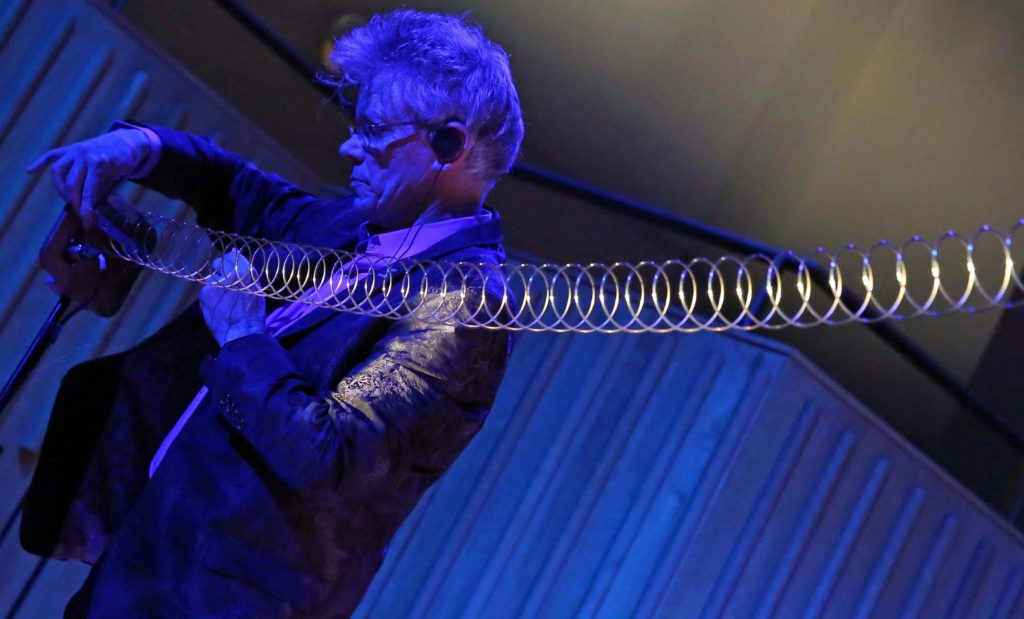The Kronos Quartet has long been part of the vanguard of invention. For 43 years, to be precise, the San Fransisco-based ensemble has pushed at the outer limits of what can be achieved with two violins, a viola and cello. Nothing lies beyond their musical compass. Whether it is from contemporary classical to chamber, early music to the experimental or Bollywood soundtracks to Bob Dylan, they consistently break all of the rules that we would normally associate with the conventional wisdom of a string quartet.
Throughout an illustrious career, their one constant has been founding member David Harrington. Sat immediately to his left tonight – and as has been the case for nigh on 40 years – is first his fellow violinist John Sherba and then Hank Dutt on viola. One place further away is relative newcomer Sunny Yang, who joined the Kronos Quartet on cello a mere three years ago. Together they take us on an astonishing, mesmerising journey across the vast musical and geographical landscapes of this world.
The first half of this evening’s performance is built around their own educational initiative, Fifty for the Future: The Kronos Learning Repertoire. An exciting new project whereby the Kronos Quartet/Kronos Performing Arts Association will commission a collection of 50 new works — ten per year for five years, split equally between both genders — it is devoted to the most recent approaches to the string quartet, and was created purely for the training of students and emerging professionals.
The opening piece, Alexander Vrebalov’s ‘My Desert, My Rose’ – like all three compositions tonight that are taken from the Fifty for the Future project, it was written specifically for Kronos – is an exercise in beautifully controlled assertion, the energy and determination of which is riven through with an almost palpable sadness. Two movements from Garth Knox’s Satellites follow, further illustrating the wonderful dexterity of the four musicians and the balance and harmony that they so effortlessly maintain throughout. It is spellbinding.
Seiche, a new work written specifically for this tour by Martin Green of the improvisational British folk band Lau, sees the introduction of two of his recently invented Kronoscillators. Stretched out between stands and meeting either side of the quartet, the huge amplified plastic coils are brought to eerie, experimental life by Harrington and Yang as they coax extended spectral sounds from these strange, wonderful contraptions. And then the Kronos Quartet head off to a short intermission by showing they can also play rock, staying remarkably true to Pete Townshend’s original ‘Baba O’Riley’ just as it had first appeared in 1971 on the album Who’s Next .
The second half takes off from where the first had ended with yet another huge, dramatic cultural shift. Here the Kronos Quartet take the old Armenian folk song ‘Groung’ (as arranged by the young Armenian-American composer, Mary Kouyoumdjian) and accurately convey all of the inherent horror, loss and suffering that lies at its very heart. Laurie Anderson’s ‘Flow’ (arranged for the Kronos Quartet by the American trombonist and composer Jacob Garchik) is a beautiful counterpoint to what had just gone before.
But the magnificent centrepiece of the second section of tonight’s performance is their interpretation of Donnacha Dennehy’s ‘One Hundred Goodbyes’ (Céad Slán). Built around Dr. Wilhelm Doegen’s original recordings of Irish folk songs and Gaelic speech, the piece is afforded an even greater emotional resonance by the inclusion of a portentous, almost indecipherable recorded voice in the background.
Two richly deserved encores follow; the first is a remarkable reinvention of the American blues singer and guitar player, Geeshie Wiley’s ‘Last Kind Words Blues’, the second a joyful romp through Ervin T. Rouse’s classic fiddle tune ‘Orange Blossom Special’. But whether it be the blues or bluegrass, music from the past or present, sombre or frivolous, their individual and collective playing is consistently technically gifted, completely flawless, always compelling and something that is really quite extraordinary. We can only all stand as one at the end and just applaud.
Photo credit: Simon Godley
Some more photos from this performance can be found HERE





